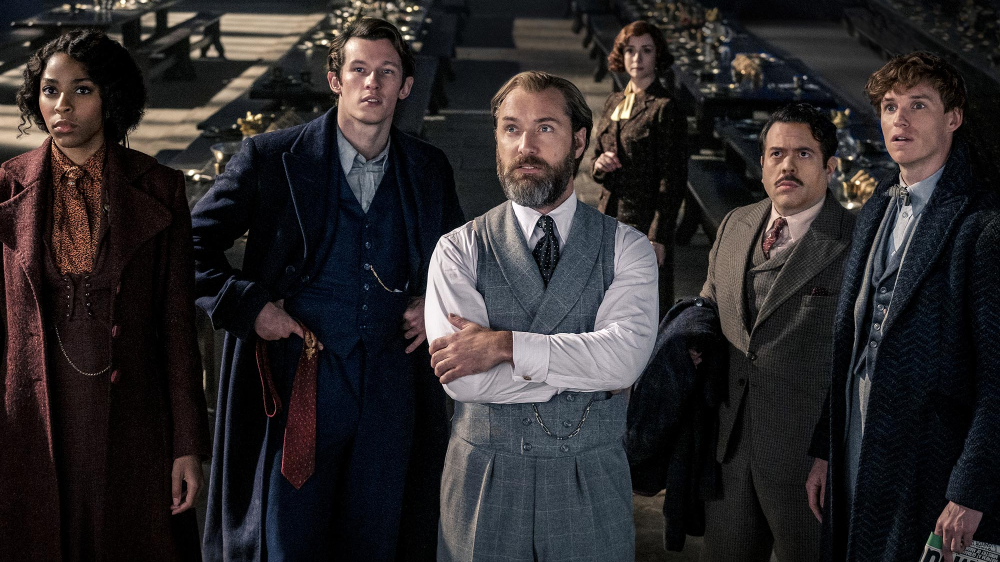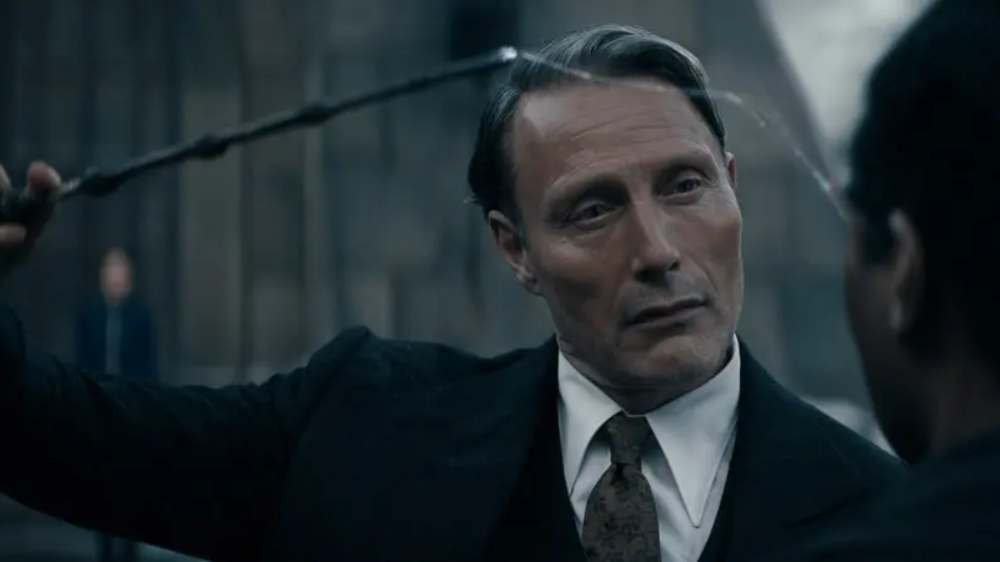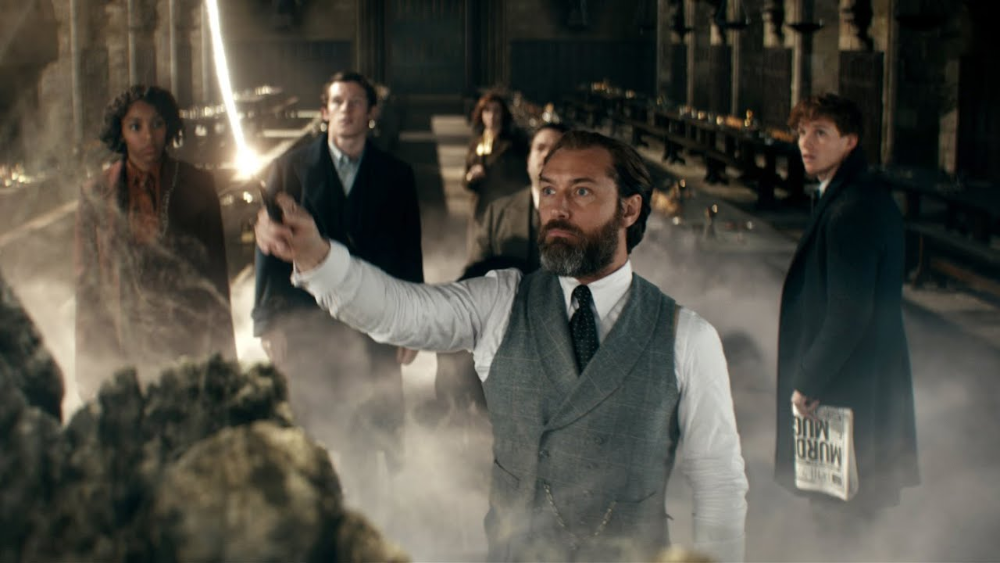
They say that only two things are certain in this world — death and taxes — but I propose we add a third to the list of universal mathematical certainties: the fact that movie studios will make an endless stream of typically lesser sequels, prequels, or remakes for any franchise that makes them significant money. When Warner Bros. first acquired the rights to produce J.K. Rowling’s Harry Potter books, they had already become a global phenomenon, but even the studio couldn’t have imagined how successful the franchise would prove on the big screen. Warners even pulled off the once-rare, now-routine trick of splitting the last movie into two parts (paving the way for franchises such as The Hunger Games and Twilight).
But shortly after saying goodbye to the original Harry Potter cast, Warners tapped Rowling to create a whole series of prequels based on a book mentioned in the Potter universe, Fantastic Beasts and Where to Find Them. And so it is that, in 2022, we are faced with the third sequel in that prequel franchise — Fantastic Beasts: The Secrets of Dumbledore, a film that is far inferior to most of its predecessors and that retains only a faint inkling of the magic that made the original Potter movies so beloved.
The Secrets of Dumbledore comes to the screen from David Yates, a Potter franchise veteran who directs from a screenplay by Rowling and Steve Kloves, who adapted nearly all of the Potter books and who, like Yates, has participated in all three Fantastic Beasts movies. The film once again stars Eddie Redmayne as Newt Scamander, the world’s only “magizoologist,” who has a fascination for bizarre animals in the wizarding world and their powers, and Jude Law as the younger version of the enigmatic Hogwarts professor Albus Dumbledore, who was a perennial presence for Harry throughout his upbringing.
The ensemble cast of this sequel also includes Mads Mikkelsen as the villainous Gellert Grindelwald (subbing in for Johnny Depp in the wake of his serious legal troubles), Dan Fogler as Muggle Jacob Kowalski, and Alison Sudol as his love interest, Queenie Goldstein, plus Ezra Miller, Callum Turner, and Jessica Williams in various supporting roles.

When the film opens, Newt is helping a mysterious, magical creature called a “Qilin” give birth. Grindelwald’s goons are after the newborn, and soon nab it from Newt’s hands (though they fail to notice that the mother has given birth to twins and that Newt nabs the second one, after all). The Qilin is part of Grindelwald’s plan to conquer the world, convinced that if it kneels before him at an upcoming election of global wizard leadership, he will be anointed leader by acclamation. Dumbledore tries to stop him, and dispatches his army of acolytes, including Newt, Kowalski, and others, to do so.
Unlike Rowling’s precisely and carefully crafted novels, the plot of Secrets of Dumbledore is mostly sloppy and disjointed. The casual observer of the Potter universe can easily set aside that Grindelwald had at his disposal many other ways of staging a coup — many later used by Lord Voldemort himself — than this contrived plan to steal a creature, kill it, bring it back to life, and then have it bow before him. The script simply does not adhere to the rules of normal logic or coherence. Newt’s brother, but no one else, is mysteriously kidnapped and sent to a prison, a subplot whose sole purpose is to bulk up the runtime with additional effects. Three of the five characters in Dumbledore’s assembled cadre of heroes are almost entirely redundant and unnecessary in terms of advancing the plot, and thus end up only confusing viewers as the list of characters in this world increases exponentially. This story being set in the 1930s — mostly in Germany — there are faint allusions to populist, extremist rhetoric, including eyebrow-raising logos that Grindelwald’s villains shoot into the sky, but Rowling seems tentative and even afraid to go near the subject, which is ultimately left by the wayside.
And though the title purports to offer “secrets,” none are actually in the making. All of the mystery of Dumbledore’s past — that he was gay and in love with Grindelwald, that the two had a blood oath, that a battle between Dumbledore and his brother, Aberforth (Richard Coyle), had led to the demise of their sister, riddling them with guilt — were all known from prior books or Rowling’s online statements. At most, the exact nature of the relationship of one of the villains to the Dumbledore family is modified from what viewers previously believed, but this plot afterthought is hardly worth the trouble of naming the entire movie.
It is apparent — to both the seasoned Potter fan and the casual moviegoer — that Rowling’s novel-writing talents do not translate neatly on the big screen. Rowling had a grand vision that unfolded with each book, a master plan that was executed with impressive mastery of fantastical world-building, especially over those first four movies. That brilliant vision then replicated itself to a lesser degree with the final three entries in the Potter book list. Fantastic Beasts, by contrast, has seen Rowling struggle to imbue her stories with that dual feeling of being both self-contained and yet part of a grander scheme — a feeling that made her books such enjoyable page-turners. Instead, The Secrets of Dumbledore is another self-contained film that feels totally divorced from other stories and, therefore, is simply less important or exciting.

But, this is the Harry Potter cinematic universe, after all, and Warner Bros. has clearly spared no expense. Composer James Newton Howard, a well-respected veteran of both this franchise and the larger fantasy genre (The Hunger Games is among his extensive credits) once more creates a pitch-perfect score that is based on John Williams’ now-classic original for 2001’s The Sorcerer’s Stone but has its own unique, darker, more heart-pounding vision. The score reaches its climax in Fantastic Beasts’ most important battle which arrives at the end, appropriately enough, and is a cinematic delight.
The other below-the-line elements are strong as well, as Cinematographer George Richmond (Free Guy) keeps the gloomier proceedings well lit, taking full advantage of a great opportunity to show off his talent in the last third of the film, which takes place atop a mile-high mountain monastery in Bhutan. Having won an Oscar for the costumes in the original Fantastic Beasts, Colleen Atwood also returns and shows off her unique blend of wizard/fantasy style with the fashion of the 1920s and ’30s, when the action in the Fantastic Beasts world is supposed to take place. Stuart Craig and Neil Lamont — also repeat players in this film franchise — are also back, and have the most fun with the varied interiors for the film, which alternate between bureaucratic offices, village pubs, and creepy dungeons, all meticulously decorated.
Ultimately, the below-the-line contributions and the acting chops of the stars in Fantastic Beasts are enough to rescue the movie from its uncompelling story. It is a delight to simply observe this movie, even if it is not fun to watch it. The biggest mystery for the Harry Potter/Fantastic Beasts franchise is whether Rowling, Kloves, Yates, and their talented cast and crew will be able to properly land this wobbly broomstick in the fourth and fifth installments of this prequel franchise, which are poised to be the last, though they haven’t been greenlit yet.
We know they’ll likely include some tie-in to the original films (think Episode III: Revenge of the Sith-style). The question is — will they give these five prequels a reason to exist in the first place? If they do not start casting a spell on audiences again, and soon, it will likely be curtains for a once-revered franchise. If they do, one can expect fans to flock to theaters in droves and after that, you can rest assured that WB will find a way to conjure up (what else?) more sequels.
Grade: B-
Fantastic Beasts: The Secrets of Dumbledore will be released in U.S. theaters on Friday, April 5 via Warner Bros.





